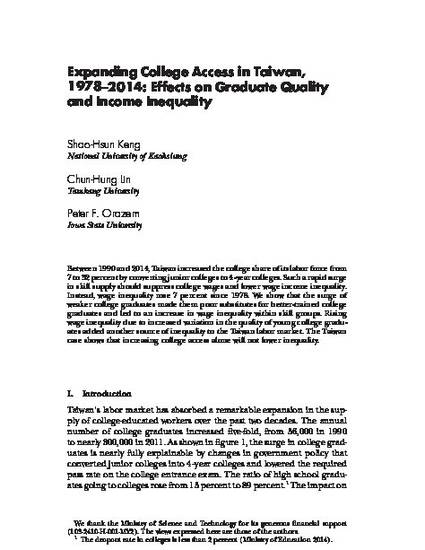
Article
Expanding College Access in Taiwan, 1978–2014: Effects on Graduate Quality and Income Inequality
Journal of Human Capital
Document Type
Article
Disciplines
Publication Version
Published Version
Publication Date
4-1-2017
DOI
10.1086/690235
Abstract
Between 1990 and 2014, Taiwan increased the college share of its labor force from 7 to 32 percent by converting junior colleges to 4-year colleges. Such a rapid surge in skill supply should suppress college wages and lower wage income inequality. Instead, wage inequality rose 7 percent since 1978. We show that the surge of weaker college graduates made them poor substitutes for better-trained college graduates and led to an increase in wage inequality within skill groups. Rising wage inequality due to increased variation in the quality of young college graduates added another source of inequality to the Taiwan labor market. The Taiwan case shows that increasing college access alone will not lower inequality.
Copyright Owner
The University of Chicago
Copyright Date
2017
Language
en
File Format
application/pdf
Citation Information
Shao-Hsun Keng, Chun-Hung Lin and Peter F. Orazem. "Expanding College Access in Taiwan, 1978–2014: Effects on Graduate Quality and Income Inequality" Journal of Human Capital Vol. 11 Iss. 1 (2017) p. 1 - 34 Available at: http://works.bepress.com/peter-orazem/133/

This article is published as Keng, Shao-Hsun, Chun-Hung Lin, and Peter F. Orazem. "Expanding college access in Taiwan, 1978–2014: effects on graduate quality and income inequality." Journal of Human Capital 11, no. 1 (2017): 1-34. doi: 10.1086/690235. Posted with permission.